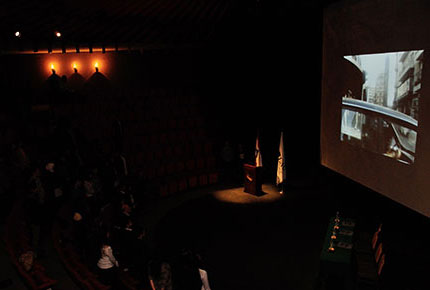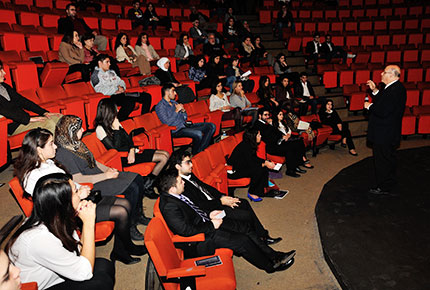Peace in practice
LAU hosts a daylong awareness-raising event dubbed “Imagining Tomorrow.”
On January 19, LAU hosted an awareness-raising event about the very serious cultural and social consequences of violence and intolerance in today’s society.
“Imagining Tomorrow” was organized by the public relations course from the Department of Communication Arts in collaboration with the university’s Outreach and Civic Engagement (OCE) unit and the Permanent Peace Movement (PPM).
The event kicked off with a newly produced documentary entitled “My Memory of the Past” that was directed and produced by Abir Chaaban, instructor of public relations, and a group of her Radio/TV/Film communication arts students. The highly emotive film, edited by LAU student Ala’a Halabi, told the story of Lebanon, beautifully superimposing images from the past onto current film footage of the country. The skillful weaving of the past and present poignantly brought home group’s message that without acknowledging the role of memory in our lives peace cannot be sustainable.
“The film was a combined faculty and student effort and we considered our duty, as responsible citizens, to make a statement about the importance of peace education in our lives,” said Chaaban. “There is a need for dialogue between the generation who experienced the war and the youth who now live in a country defined by the consequences of actions they had no part in,” she explained. “This new generation deserves to live in a country that is secure with peaceful coexistence—our power is in our difference,” she told the crowd after the screening of the documentary.
“Peace brought us here today,” said Yasmina El-Sabeh, an LAU student and organizer, featured in the documentary, “This is an opportunity for us all to be made more aware of our hurtful past so that we can build a more hopeful future.” Paraphrasing the late Nelson Mandela, she declared: “Education is the most powerful weapon to change the world—we all want to see Lebanon in peace, not pieces.”
Incorporating a culture of peace within the government education system is advocated by the PPM, an NGO funded by the Federal Republic of Germany Foreign Office. “The civic engagement program we have currently is not adequate—our research has shown that we need to go beyond civics for peace education, we need to look at the experience of history through a memory lens,” said Maysa Murad of PPM. “First and foremost, we need classrooms that encourage controversy and promote engagement and get rid of hierarchy between students and instructors,” she added.
Echoing the importance of education in fostering peace in society, OCE’s Executive Director Elie Samia outlined how LAU is participating in providing a space for such events to take place. “OCE’s mission is in line with the overall mission of the university, which includes the formation of leaders in a diverse world,” he explained, adding: “That is why this university has given the means to organize wide-ranging activities that promote peace and tolerance.”
Ending on a highly optimist note, Samia passionately reminded the audience: “The state may be weak in Lebanon but the civil society is stronger than ever thanks to people like yourselves.”
More
Latest Stories
- How Does Digital Media Impact Our Brain?
- Community Development Takes Root at Capstone Presentation Day
- LAU Athletes Return Victorious from Athens and Belgrade
- A New Initiative Toward Harnessing Digital Transformation
- A Cardiovascular Conference to Streamline National Expertise
- Aspiring Engineers Compete for Scholarships at LAU
- The School of Engineering Delivers Immersive Learning Experiences
- Consultants in the Making



